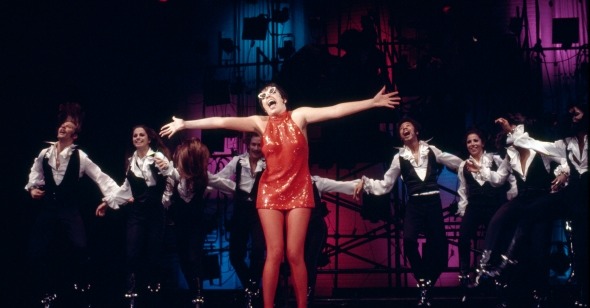Liza with a Z
Dir. Bob Fosse, 1972, U.S., Showtime Entertainment
by Michael Koresky
For the avid Bob Fosse fan of a younger generation, there’s always been a viewing gap, as far as his brief but peerless directorial career is concerned. For in between his era-defining and rather anomalous musical Cabaret and the stinging, tobacco-stained black-and-white backrooms of Lenny, Fosse threw himself whole-hog, along with John Kander and Fred Ebb, into the elaborate enshrinement of Liza Minnelli as razzle-dazzle stage icon with his spectacular concert film of her steamrolling one-woman show, Liza with a Z. Pre Marty Scorsese love affair, pre Studio 54 binge, pre Arthur 2: On the Rocks, Minnelli was, it should not be forgotten, a simultaneous Tony, Oscar, Emmy, and Grammy winner, none of which sound as impressive individually until piled atop each other like different flavors on a wedding cake. Where Liza earned her purple heart, however, establishing herself as a showtune performer with gale force, was on stage in 1972, enacting Liza with a Z’s delightfully over-the-top succession of standards and oddities. It’s a wondrously cut, gloriously framed, and wholly unpretentious bit of Fosse eye and ear candy, providing a satiating morsel for those who could never get enough of his trademark jazz hands and rhythmic editing. Yet for those who remain agnostic about Minnelli herself, Liza with a Z will prove more than just a Fosse side-note; it’s a reminder of its central diva’s utter command of her craft.
Just as Fosse helped make irregular spinal patterns sexy, with Cabaret and this 55-minute film, which aired on network TV in September of 1972, he firmly established the duck-faced, bulbous-nosed Hollywood offspring as an unlikely sexual presence. With her seemingly super-glued on eyelashes and ever-mulletting black hair, Minnelli certainly didn’t look the part of a dazzling showgirl, especially as her face awkwardly amalgamated perhaps her parents’ worst features, something like a Puppetoon version of Judy and Vincente. Prior to Cabaret, Liza had cut her movie teeth in the late Sixties with starring roles in a pair of smallish dramatic pieces about social outcasts, The Sterile Cuckoo and Tell Me That You Love Me, Junie Moon. So the one-two punch of the 1972 Fosse films really drove home Minnelli’s growing star persona, cementing once and for all her claims to the Judy Garland legacy. Preternaturally poised and charmingly self-effacing, Minnelli tore into her Broadway tunes with an rip-roaring effortless belt that emanated almost preposterously from a half-opened mouth; it’s almost as if she’s throwing her voice—like Ethel Merman reborn as a ventriloquist.
As stunning as it must have been to witness Minnelli emerge from out of the shadows of her legendary parents in 1972, it remains an equally potent sock to the gut to watch Liza with a Z today, in its radiantly restored DVD collector’s edition, out from Showtime. Post alcoholism, drug addiction, and two knee replacements, Minnelli’s become much-Googled fodder for cheap, sturdy laughs in everything from South Park to Arrested Development. Thus, it’s her physical dynamism that most astonishes here, from her nailing of Fosse’s sultry, athletic moves to her high-cut pink single pieces daringly revealing her “generous” gams. Once she really gets revved up, almost every number is itself a climax; these aren’t so much showstoppers as jawdroppers, and with so many songs in succession packed into one tight hour, each with Minnelli’s piercing vibrato and Fosse’s inventive, expansive footwork, Liza feels almost like sensory overload.
Kander and Ebb, those cynical old so-and-sos who expertly balanced vaudeville showmanship and world-weary pathos in songs from Cabaret to Chicago to Kiss of the Spider Woman, are generally considered Minnelli’s tried-and-true footmen. And certainly, many of her most rousing vocals here accompany their tunes, most popularly in the reliably monumental climactic Cabaret medley, and most notably in the original piece “Ring Them Bells,” which borrows Barbra Streisand’s borscht-belt anecdotal asides to tell the tale of a New York lonely lady who must travel all the way to Europe to find the man of her dreams, who just happens to live next door at her Upper West Side apartment. Yet the greatest gambits here are the wholly unexpected, goofily incongruous numbers, each one initially eliciting an inquisitive “Really?” before allowing Liza to smoothly assimilate. A completely unexpected rendition of Southern soulster Joe Tex’s “I Gotcha” opens with a pair of mustachioed, cowboy hat-adorned prowlers in sunglasses and tights slinking across the stage with porn-tastic menace. Soon, in bursts Liza, having quick-changed into that skimpy silken pink number, gyrating and thrusting to Tex’s funked out wails.
Then of course, there’s the terrific update of “Bye Bye Blackbird,” featuring the show’s most intricate and telltale Fosse choreography, in which a tight tuxedoed Liza is joined by a too-close-for-comfort gaggle of black-clad dancers center stage. And the “No, she didn’t!” effect hits maximum wow with her unabashedly on-one-knee “My Mammy,” an homage to Mommy’s homage to Al Jolson—in blackface this couldn’t have been any bolder. Fosse, meanwhile, surveys with his eminent cool, even as a million unspoken dramas explode across Minnelli’s every gesture. The disc itself reaches a poignant conclusion when we flash forward thirty-three years to see a frumpy but game Liza climb up onstage at the Toronto Film Festival to see the restored cut. Noticeably stretched and exhuasted, she nevertheless rises out of her chair and strikes a fancy Fosse pose. Despite what life’s dealt her, the gal’s still got it.
